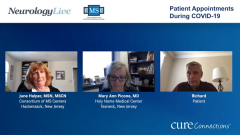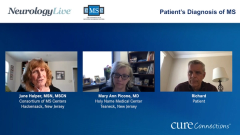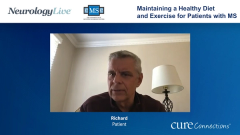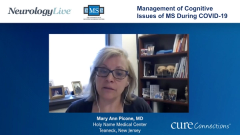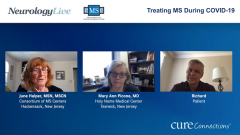
Maintaining a Healthy Diet and Exercise for Patients With MS
Maintaining a healthy diet and exercise when combating multiple sclerosis.
Episodes in this series

June Halper, MSN, MSCN: One thing we spoke about earlier was lifestyle issues. A lot of information is starting to emerge about things like complementary and natural therapies. Certainly, we’ve always talked about proper nutrition. We always examined how people were eating. Richard, are there any other strategies, other than what we spoke about earlier, in terms of your diet? Are you eliminating certain things, adding certain things, or taking supplements?
Richard: Yes. When I was diagnosed with MS [multiple sclerosis], we had to look at the whole picture. I don’t want to let all the other issues, like blood pressure, weight, or the other issues of my health, become secondary. They all had to become important to manage the MS. I do all the cooking in my house, so we’ve really changed the way we cook. I cook with virtually no processed foods anymore. I make everything from scratch, and it takes more time.
June Halper, MSN, MSCN: When are you serving dinner?
Mary Ann Picone, MD: Exactly. When are we coming over for dinner?
June Halper, MSN, MSCN: We’ll be over.
Richard: Anytime. But I do. I make a lot of my breads from scratch. If we’re making muffins, the muffins are from scratch. I try not to use anything processed. It has helped me lose weight. It has helped me keep my blood pressure and cholesterol in check. We have changed our entire diet in terms of just eating natural, healthy foods that are not processed.
June Halper, MSN, MSCN: That sounds wonderful.
Richard: We eat virtually everything now. We eat very little beef, but we do eat chicken. We’ll eat anything, but in moderation. And I probably prepared it, so I know what’s in it.
June Halper, MSN, MSCN: Do you experience MS fatigue?
Richard: I experience terrible MS fatigue. That with a couple of the other issues, like mobility and lack of sleep, are some of the big ones. It seems as though I have to manage my day with fatigue. I get a certain period of time, let’s say from 11 AM to 6 PM, where I can get most of my work done, whether it’s cooking or me getting outside for myself. I have to do it within a certain time, because mornings are very difficult. It’s almost as if there’s a fog of war. And I’ll tell you what fatigue feels like, because people think it’s like, “Are you tired?” To me, it feels like I ran a marathon yesterday, and now I have to get up and I have to walk in quicksand. I have to do that every day. That’s just how it is. So the fatigue is just a crushing experience. I have to manage and moderate all my activities to get my workload done that I want to get done. So I plan. I plan and I plan and I plan.
June Halper, MSN, MSCN: Dr Picone, he should be 1 of the teachers at the MS center.
Mary Ann Picone, MD: I wish everybody were like Richard. No. 1, he listens to what I tell him to do most of the time. I shouldn’t say “tell you what to do.” He’s very proactive about taking care of his health, and it’s not easy to be. It’s not easy for me—and probably for you, June— to prepare and cook everything from scratch as Richard has been doing. It takes time, but it’s not impossible. People can do it. There are so many ways that patients can work on improving their nutritional status and manage it, because it makes such a big difference. We are learning more and more about the importance of a healthy diet, its effect on the gut microbiome, and how it impacts MS disease activity. Being able to do these things, like exercise and activity, on a daily basis has a big effect. I try to encourage patients. No matter what your ability is, try to do a little bit of something each day.
June Halper, MSN, MSCN: I want to thank our audience for watching this Neurology Live® Cure Connections®. If you enjoyed this program, please subscribe to our e-newsletter to receive information about other upcoming programs.
Transcript Edited for Clarity
Newsletter
Keep your finger on the pulse of neurology—subscribe to NeurologyLive for expert interviews, new data, and breakthrough treatment updates.

